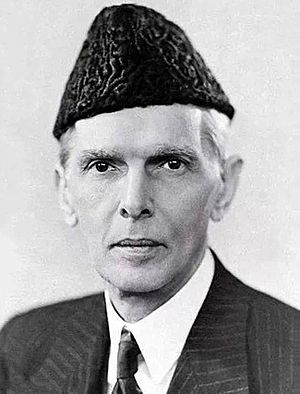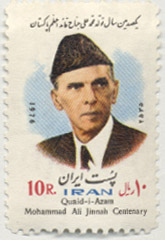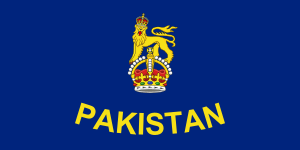Muhammad Ali Jinnah facts for kids
Quick facts for kids
Quaid-e-Azam
Baba-i-Qaum Muhammad Ali Jinnah
محمد علی جناح |
|
|---|---|

Jinnah in 1945
|
|
| 1st Governor-General of Pakistan | |
| In office 14 August 1947 – 11 September 1948 |
|
| Monarch | George VI |
| Prime Minister | Liaquat Ali Khan |
| Preceded by | Position established |
| Succeeded by | Khawaja Nazimuddin |
| Speaker of the Constituent Assembly of Pakistan | |
| In office 11 August 1947 – 11 September 1948 |
|
| Deputy | Maulvi Tamizuddin Khan |
| Preceded by | Position established |
| Succeeded by | Maulvi Tamizuddin Khan |
| President of the Constituent Assembly of Pakistan | |
| In office 11 August 1947 – 11 September 1948 |
|
| Deputy | Liaquat Ali Khan |
| Preceded by | Office created |
| Succeeded by | Office abolished |
| Personal details | |
| Born |
Mohammedali Jinnahbhai
25 December 1876 Karachi, Bombay Presidency, British India (present-day Sindh, Pakistan) |
| Died | 11 September 1948 (aged 71) Karachi, Federal Capital Territory, Dominion of Pakistan (present-day Sindh, Pakistan) |
| Resting place | Mazar-e-Quaid |
| Nationality | British Indian (1876–1947) Pakistani (1947–1948) |
| Political party | Muslim League (1947–1948) |
| Other political affiliations |
Indian National Congress (1906–1920) All-India Muslim League (1913–1947) |
| Spouses |
Emibai Jinnah
(m. 1892; died 1893)Rattanbai Petit
(m. 1918; died 1929) |
| Relations | See Jinnah family |
| Children | Dina Wadia |
| Alma mater | The Honourable Society of Lincoln's Inn |
| Profession |
|
| Signature |  |
Mohammad Ali Jinnah (Urdu: محمد علی جناح; Gujarati: મહંમદ અલી ઝીણા; born December 25, 1876 – died September 11, 1948 in Karachi) was a very important Pakistani politician. He is known as the founder of Pakistan. After India was divided, he became the first Governor-General of Pakistan.
People in Pakistan show their respect by calling him Quaid-e-Azam. This Urdu phrase means "the great leader". He was also called Baba-I-Quam, which means "the father of the nation". His birthday is a national holiday across Pakistan.
Contents
Early Life and Education
Muhammad Ali Jinnah was born on December 25, 1876, in Karachi. His family belonged to the Isma'ilism faith. His father was Jinnah Poonja and his mother was Mithibai. Jinnah was the oldest of their seven children. His family had moved to Sindh from the Kathiawar area of Gujarat, India.
Jinnah's birth name was Mahomedali Jinnahbhai. He later simplified it to Muhammad Ali Jinnah. At home, his family spoke Gujarati, Kutchi, and English. Not much is known about his siblings, except for his sister Fatima Jinnah.
Studying Law in London
In 1891, when Jinnah was fifteen, he went to London. He worked for a company for a few years. Around this time, his mother passed away.
In 1894, Jinnah decided to study law. He joined Lincoln's Inn and finished his studies in 1896. While in London, he also started to get involved in politics. He looked up to Indian political leaders like Dadabhai Naoroji and Sir Pherozeshah Mehta. Jinnah began to believe that India should have its own government under a constitution.
During this time, his father's business faced difficulties. This made things hard for Jinnah. He started working as a lawyer in Mumbai and became very successful. He even built a house in Mumbai, now known as Jinnah House. In 1908, he defended Bal Gangadhar Tilak, a famous leader, against charges of opposing the British government.
Jinnah's Political Journey
Jinnah joined the Indian National Congress in 1906. This was the biggest political group in India. Many Congress members wanted India to have limited self-government, and Jinnah agreed. His role model at that time was Gopal Krishna Gokhale.
On January 25, 1910, Jinnah became a member of the Imperial Legislative Council. He was very active in the Council. Like many other Indian leaders, Jinnah supported Great Britain during World War I. They hoped that after the war, Britain would give India more political freedom.
Joining the Muslim League
At first, Jinnah avoided joining the All-India Muslim League. This was another political group formed by Muslims in 1906. But in 1913, Jinnah became a member of the Muslim League. He later became its president in 1934. He helped create an agreement between the Congress and the Muslim League in 1916, called the Lucknow Pact. This agreement aimed to show a united front to the British. They wanted India to become a self-governing dominion, similar to Canada or Australia.
In 1918, Jinnah married Rattanbai Petit. She was the daughter of his friend, Sir Dinshaw Petit. Rattanbai became Muslim before marrying Jinnah and changed her name to Maryam. They lived in Bombay and traveled often. In 1919, they had a daughter named Dina.
Differences with Gandhi
By 1918, Mohandas Gandhi became a key leader of the Congress Party. Gandhi believed in non-violent protests to gain self-government. Jinnah, however, preferred to achieve self-government through legal and constitutional methods. Jinnah also disagreed with Gandhi's support for the Khilafat movement.
Because of these differences, Jinnah left the Congress Party in 1920. He became the president of the Muslim League. Jinnah proposed a plan with fourteen points to reduce the disagreements between the Congress and the Muslim League. This plan was known as Jinnah's Fourteen Points, but the Congress Party did not accept them.
Jinnah's personal life faced challenges during these years. His focus on politics created difficulties in his marriage. Rattanbai and Jinnah separated in 1927, and she passed away after an illness.
Jinnah attended the Round Table Conference in London, which was a meeting between Indian leaders and the British government. The conference did not succeed. Jinnah was also unhappy with the Muslim League at this time, so he decided to leave politics and work as a lawyer in England. His sister, Fatima Jinnah, managed his home and affairs. She also helped raise his daughter, Dina Wadia.
Leading the Muslim League
Many Muslim leaders, including Aga Khan III and Sir Muhammad Iqbal, asked Jinnah to return to India. They wanted him to lead the Muslim League again. Jinnah agreed and came back to India in 1934 to reorganize the party.
The Muslim League did not win many seats in the 1937 elections. However, the Premier of Punjab, Sir Sikandar Hayat Khan, helped the League. In October 1937, he agreed to work with Jinnah's Muslim League. This agreement was called the Jinnah-Sikandar Pact.
Jinnah's disagreements with the Congress Party grew. By 1930, some Muslim leaders like Allama Iqbal had suggested a separate country for Muslims in India. Jinnah eventually came to believe that Hindus and Muslims could not live together in one country. He and the Muslim League began working towards this separate country. In 1940, they made a plan called the Pakistan Resolution. This new country was to be named Pakistan.
In 1941, Jinnah started a newspaper called Dawn. This newspaper shared the Muslim League's ideas and political views. During World War II, Jinnah supported the British. He opposed the Congress party's Quit India movement. In 1944, Gandhi and Jinnah had 14 meetings, but they could not reach an agreement. By this time, the Muslim League had formed governments in some provinces and joined the central government.
Founding Pakistan
After the Second World War, Great Britain began plans to give India independence. On May 16, 1946, the British announced a plan for a united India. A month later, on June 16, 1946, they announced another plan to divide British India into two countries: one for Hindus and one for Muslims.
The Congress Party accepted the May 16 plan. The Muslim League, led by Jinnah, accepted both plans. However, on August 16, 1946, Jinnah called for "Direct Action" to achieve independence for Pakistan. After many discussions, British India was divided in August 1947 into two countries: India and Pakistan. Later, in 1971, Bangladesh gained independence from Pakistan.
First Governor-General
When British India was divided, Jinnah became the first Governor-General of Pakistan. His sister, Fatima Jinnah, was called the "Mother of the Nation." He also became the president of Pakistan's assembly. On August 11, 1947, Jinnah spoke to the assembly about Pakistan's future as a country where all religions would be equal. He said:
You may belong to any religion caste or creed - that has nothing to do with the business of the state. In due course of time, Hindus will cease to be Hindus and Muslims will cease to be Muslims, not in the religious sense, because that is the personal faith of each individual, but in the political sense as citizens of the state.
Jinnah also took direct control of the government. After the partition, there was a lot of violence between Muslims and Hindus, especially in Punjab and Bengal. Jinnah traveled to these areas with Hindu leaders from India to help calm people down. Many people died in this violence, which made Jinnah very sad.
Soon after India and Pakistan became independent, a conflict started in Kashmir. Kashmir's ruler decided to join India. However, most Muslims in Kashmir did not agree and began fighting. India sent troops to Kashmir. India then took the issue to the United Nations, which called for an end to the fighting and a public vote. This problem still affects the relationship between India and Pakistan.
Jinnah's role in creating Pakistan was very important. This made him very popular among the people of Pakistan. However, in East Pakistan (now Bangladesh), people did not agree with Jinnah's idea that Urdu should be the only national language.
Death
Muhammad Ali Jinnah had been sick with tuberculosis since the early 1940s. Only his sister and a few close people knew about his illness. After India was divided and Pakistan was created, he became the Governor-General. His work increased, but his health got worse. To try and get better, he spent many months at his official rest house in Ziarat. But he could not recover. He died on September 11, 1948, from tuberculosis.
Modern Views on Jinnah
Today, some experts have new ideas about Jinnah's actions. They point out that Jinnah showed interest in some Hindu-majority states joining Pakistan. These experts argue that this goes against his earlier belief that Hindus and Muslims could not live together.
Some historians, like H. M. Seervai and Ayesha Jalal, believe that Jinnah actually wanted a united South Asia. They suggest he only demanded a separate state for Muslims because the Congress leaders were not willing to share power with the Muslim League.
Recently, Indian politicians from the Bharatiya Janata Party, such as L. K. Advani and Jaswant Singh, have praised Jinnah. Jaswant Singh was even removed from his party because he praised Jinnah in his book, 'Jinnah- India, Partition and Independence'.
Remembering Jinnah

Many things have been done to remember Jinnah. In Pakistan, he is known as Quaid-e-Azam. His picture is on many Pakistani banknotes and coins. Karachi's international airport is named after him. In 1998, a new university in Karachi was named the Mohammad Ali Jinnah University. Another university in Islamabad is named Quaid-e-Azam University.
Many other places and institutions in Pakistan and other countries are named after him. For example, a large street in Turkey is named after him. In Iran, a highway in its capital city Tehran bears his name. In Mumbai, a public hall called Jinnah Hall is named after him.
Many books, movies, and TV shows tell the story of Jinnah's life and work. This includes the biographical movie, Jinnah.
Famous Quotes
- "With faith, discipline and selfless devotion to duty, there is nothing worthwhile that you cannot achieve."
- "Think 100 times before you take a decision, But once that decision is taken, stand by it as one man."
- "Failure is a word unknown to me."
- "No nation can rise to the height of glory unless your women are side by side with you."
- "Expect the best, Prepare for the worst."
- "No struggle can ever succeed without women participating side by side with men."
- "You have to stand guard over the development and maintenance of Islamic democracy, Islamic social justice and the equality of manhood in your own native soil."
- "Islam expect every Muslim to do this duty, and if we realise our responsibility time will come soon when we shall justify ourselves worthy of a glorious past."
- "That freedom can never be attained by a nation without suffering and sacrifice has been amply borne out by the recent tragic happenings in this subcontinent."
- "We are victims of evil customs. It is a crime against humanity that our women are shut up within the four walls of the houses as prisoners. There is no sanction anywhere for the deplorable condition in which our women have to live."
- "Pakistan not only means freedom and independence but the Muslim Ideology which has to be preserved, which has to come to us as a precious gift and treasure and which, we hope other will share with us."
Images for kids
-
Lincoln's Inn, seen in 2006
-
Jinnah with Mahatma Gandhi in Bombay, 1944
-
Lord Louis Mountbatten and his wife Edwina Mountbatten with Jinnah in 1947
-
Jinnah speaking at the Constituent Assembly of Pakistan on 14 August 1947
-
Tomb of Muhammad Ali Jinnah in Karachi
-
Statue of Jinnah at York University in Toronto
-
Blue Plaque in London dedicated to Jinnah
See also
 In Spanish: Muhammad Ali Jinnah para niños
In Spanish: Muhammad Ali Jinnah para niños





















